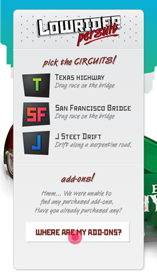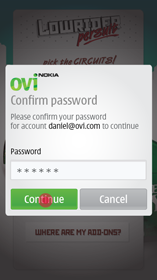Game: Restoring not allowed (DRM in use, user signed out)
This design example describes a scenario where an end user is not allowed to restore earlier purchases. The content is protected with built-in DRM, and the user is not yet signed in to Nokia Store.
The user has earlier purchased additional racing circuits for a Low Rider Pursuit application on their old device, and now wants to restore the same add-ons on their old device. The situation is the following:
The user has previously purchased guides on a different device, but does not have the right to access them on a new device.
The user is not signed in to Nokia Store. This means that when launched, the application is not able to silently check the user's eligibility for restoration from Nokia Store. Instead, the application provides a UI option, which the user can select if they want to check if they are entitled to any restorable items.
 |
 |
 |
 |
 |
Screen 1: To play the game and access all the available racing circuits, the user presses the New Game button. |
Screen 2: The application only displays the default racing circuits, because it does not yet know if the user has previously purchased some add-ons that could now be restored. It displays a button to the user to check if any purchased add-ons are missing, and the user presses the button to do the check. |
Screen 3: Because the user is not signed in, Nokia Store prompts the user to enter the password. |
Screen 4: The application informs the user that they are not eligible to restore any add-ons. |
Screen 5: The application displays the default racing circuits, and an option to purchase add-ons. |